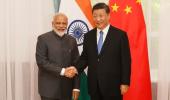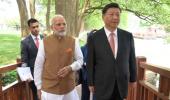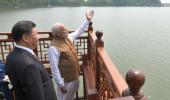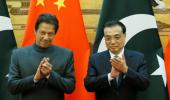'China, much more than Pakistan, is a credible potential adversary with the ability to hurt our interests.'
'It must figure higher in our national security concerns,' says Vice Admiral Premvir Das (retd).
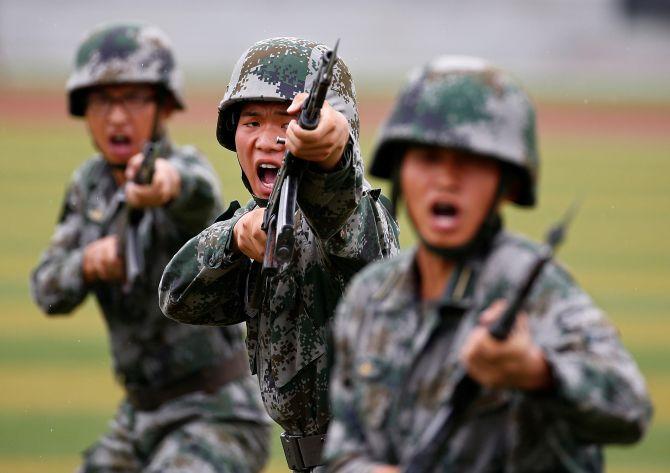
With the noise and din of the elections behind us and a new government in place, it is time to reflect on the issues that were in the forefront of the campaign -- national security and nationalism.
While the latter can be subject to different interpretations, all difficult to analyse, the former is a much more precise term.
The surgical strike two years ago was followed by the Pulwama terror attack in February this year, leading to the Balakot retaliatory strike soon thereafter, and the electioneering was full of assertive rhetoric, with Pakistan identified as the adversary which would be dealt with sternly, unlike in the days gone by.
Interestingly, China found no mention in these articulations.
Yet, for the 700-odd kilometres of the Line of Control that India shares with Pakistan, that with China, all of it disputed, is nearly 4,000 kilometres.
Not just that, China sits on our territory in Aksai Chin, and also lays claim to Arunachal Pradesh. It is, therefore, necessary to look at national security a little more realistically.
A country's security has many dimensions, of which the military angle is only one; yet it is the most crucial.
Looked at from this point of view, let us examine the relevant equations. On land, despite our commitments on the northern borders, it is difficult to see any Pakistani army headquarters recommending military confrontation with India.
Much the same can be said of the balance between the two air forces. It is true that the Pakistan air force retaliated on the very day after the Balakot strike, downing one of our MiG-21 aircraft, but its aircraft stayed away from our territory.
At sea, the balance of advantage lies predominantly with us.
So, the probability that our territorial integrity can be compromised, even threatened, by Pakistani military action is remote.
Yes, indirect support to terrorist acts in India and especially in the Kashmir valley from Pakistan can be expected to continue, though its extent will be constrained by that country's own critical economic state as well as international pressure, as also the likelihood of an assertive Indian response.
Seaborne terror such as in the Mumbai attacks in 2008 or in the 1993 blasts, when explosives were brought across by sea and landed on the Ratnagiri coast, has been there. But the seminal region of concern is the valley.
In short, while the terrorism aspect will need to be countered, politically and otherwise, Pakistan's ability to militarily challenge our national security is not all that credible.
With China, the situation is quite different. First, in any confrontation across the land border it has decided superiority.
In the air, there is some degree of parity, since Chinese aircraft have to operate from high altitudes, thus suffering some degradation in capability. But even then, to say that we are equal to them would be optimistic.
In the Indian Ocean Region, we presently have clear advantages, but these could be fast eroding, given the increasing Chinese naval presence in this part of the world, including access to base facilities at Gwadar and Djibouti.
Their territorial claims are potentially confrontational, as was seen at Doklam and elsewhere in earlier years.
As India grows in economic power and seeks a larger stature in Asia and even global geopolitics, it is certain to face direct and indirect hostility from China, of which its close relations with Pakistan are only one facet.
Trade will continue to remain one-sided and pressures might even be mounted on us in the South China Sea, through which more than half of our overseas trade traverses.
So, China, much more than Pakistan, is a credible potential adversary with the ability to hurt our interests. It must figure higher in our national security concerns.
It might be argued that some redeeming features in the India-China relationship have emerged in the last few years. After some tense moments, Doklam faded away.
The Wuhan meeting of the two heads of government was more cordial than might have been expected, and the most recent Chinese gesture of agreeing to brand Jaish leader Masood Azhar an international terrorist is a positive.
China is also facing increasing trade-related pressure from the United States, which might see it gravitate it to a more amenable position towards us.
That having been said, in seeking power parity with the US, as it does, it will always find India on the 'other side' and that it cannot wish away.
So, differences between the two countries will remain, which can be 'managed or escalated', depending on the geopolitical needs of the times.
We must be prepared for them. Its close relationship with its all-weather friend, Pakistan, is certain to continue.
In sum, our national security concerns should centre more on China than on Pakistan. The potential threats that we face from the latter are marginal, compared to those that could come from our north, and our military preparedness must be structured accordingly.
Our areas of strength, such as at sea, must be maximised, just as weaknesses elsewhere must be plugged, inadequate road connectivity to the borders -- which constrains quick deployment of land forces -- being one.
It will be desirable to look at these issues and force compositions in their totality and holistically.
Fortunately, in the new external affairs minister we have a person who knows better than most how the cards are placed. The continuance of National Security Advisor Ajit K Doval is a bonus, but should not inhibit fresh thinking.
The new government should take a second look at national security now that the elections are behind us.
Vice Admiral Premvir Das (retd) has been a member of the National Security Advisory Board.

